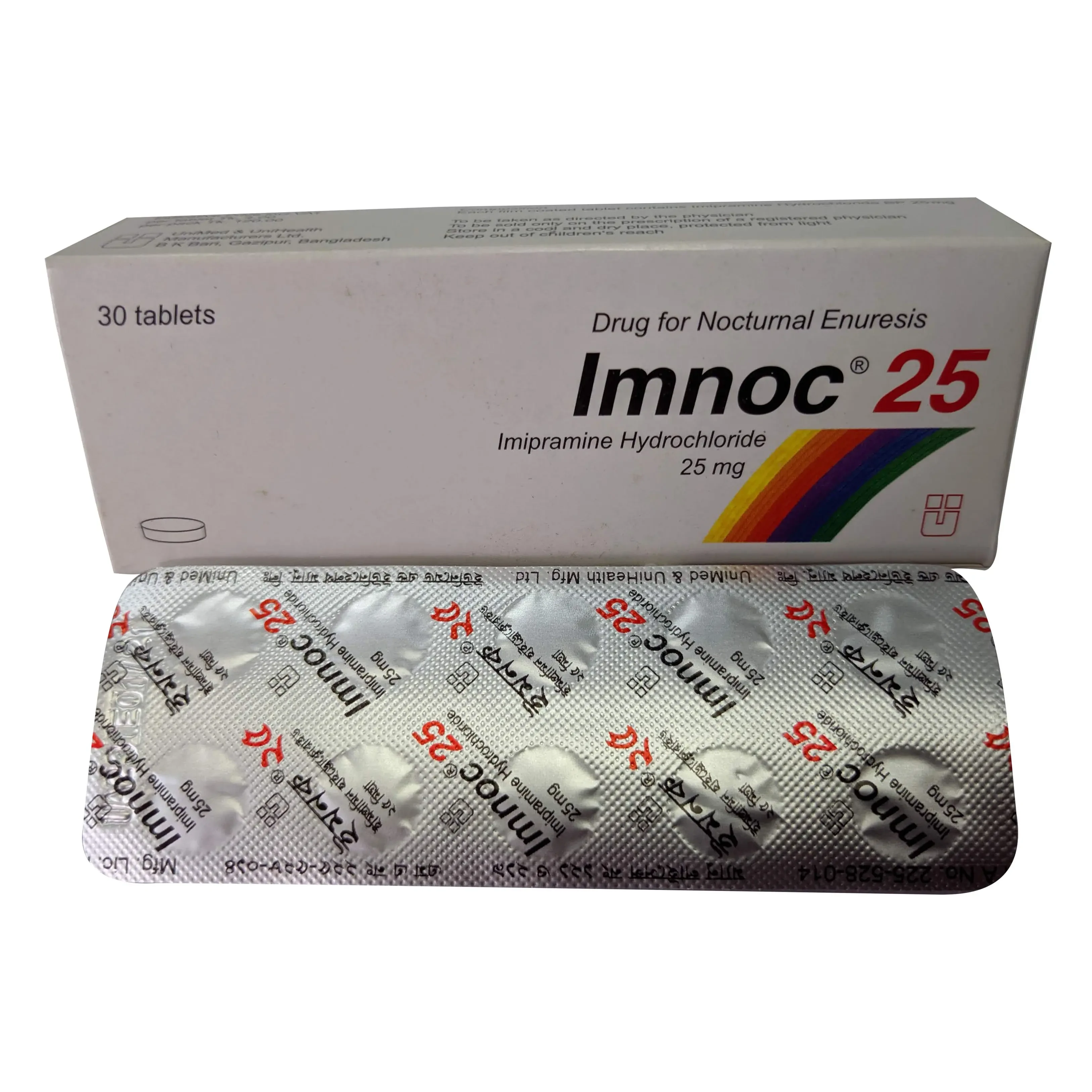Unit Price:
৳ 4.00
(3 x 10: ৳ 120.00)
Strip Price:
৳ 40.00
Indications
Imnoc is indicated in-
- Depressive illness
- Nocturnal enuresis in children.
Description
Imnoc is an original tricyclic antidepressant, a member of the dibenzazepine group of compounds. The mechanism of action of Imnoc is not definitely known. However, it does not act primarily by stimulation of the central nervous system. The clinical effect is hypothesized as being due to the potentiation of adrenergic synapses by blocking uptake of norepinephrine at nerve endings. The mode of action of the drug in controlling childhood enuresis is thought to be apart from its antidepressant effect.
Pharmacology
Imipramine works by inhibiting the neuronal reuptake of the neurotransmitters norepinephrine and serotonin. It binds the sodium-dependent serotonin transporter and sodium-dependent norepinephrine transporter reducing the reuptake of norepinephrine and serotonin by neurons. Depression has been linked to a lack of stimulation of the post-synaptic neuron by norepinephrine and serotonin. Slowing the reuptake of these neurotransmitters increases their concentration in the synaptic cleft, producing knock-on effects in protein kinase signaling which is thought to contribute to changes in neurotransmission and brain physiology which relieves symptoms of depression.
Dosage & Administration
Depression:
- Initially up to 75 mg daily in divided doses increased gradually to 150-200 mg (up to 300 mg in hospital patients)
- Up to 150 mg may be given as a single dose at bedtime
- Elderly initially 10 mg daily, increased gradually to 30-50 mg daily
- Child not recommended for depression
- Child 7-8 years: 25 mg
- 8-11 years: 25-50 mg
- Over 11 years: 50-75 mg at bedtime; max
Interaction
Methylphenidate may increase the effects of imipramine. This is usually avoided by reducing the dosage of imipramine. Imnoc may increase the depressant action of alcohol. Dangerously high blood pressure has resulted from the combination of imipramine, and members of monoamine oxidase (MAO) inhibitors. Because of this, imipramine should never be taken in combination with MAO inhibitors. Patients taking any MAO inhibitors, for example phenelzine sulfate or tranylcypromine sulfate, should stop the MAO inhibitor then wait at least 14 days before starting imipramine or any other tricyclic antidepressant. The same holds true when discontinuing imipramine and starting an MAO inhibitor. The anticholinergic (drying out) effects of imipramine are additive with other anticholinergic drugs such as benztropine, biperiden, trihexyphenidyl, and antihistamines.
Contraindications
Imipramine should not be given in conjunction with, or within 14 days of treatment with a MAO inhibitor. The combined therapy of this type could lead to the appearance of serious interactions such as hypertensive crises, hyperactivity, hyperpyrexia, spasticity, severe convulsions or coma and death may occur. Imipramine is contraindicated in patients with existing severe hepatic or renal damage, and those with a history of blood dyscrasias. Imipramine is contraindicated in patients who have shown hypersensitivity to the drug or hypersensitivity to tricyclic antidepressants belonging to the dibenzazepine group. Imipramine is contraindicated for use during the acute recovery phase following myocardial infarction. It should not be used in patients with convulsive disorders or glaucoma.
Side Effects
The most frequent of side effects are dry mouth, constipation, urinary retention, increased heart rate, sedation, irritability, dizziness, and decreased coordination. Dry mouth, if severe to the point of causing difficulty speaking or swallowing, may be managed by dosage reduction or temporary discontinuation of the drug. Imnoc usage has been linked to both increases and decreases in blood pressure and heart rate. Heart attacks, congestive heart failure, and strokes have been reported. Confusion, disorientation, delusions, insomnia, and anxiety have also been reported as side effects in a small percentage of people taking imipramine. Problems associated with the skin (loss of sensation, numbness and tingling, rashes, spots, itching and puffiness), seizures, and ringing in the ears have also been reported. Nausea, vomiting, loss of appetite, diarrhea, and abdominal cramping are all side effects associated with imipramine usage in a small number of people.
Pregnancy & Lactation
Pregnancy category D. Limited data suggest that imipramine is likely to be excreted in human breast milk. Known risk of damage to fetus.
Precautions & Warnings
Imnoc should be used cautiously and with close physician supervision in people, especially the elderly, who have benign prostatic hypertrophy, urinary retention, and glaucoma, especially angle-closure glaucoma. The sedative effect is increased when imipramine is taken with other central nervous system depressants, such as alcoholic beverages, sleeping medications, other sedatives, or antihistamines. Imnoc may increase heart rate and stress on the heart. It may be dangerous for people with cardiovascular disease, especially those who have recently had a heart attack, to take Imnoc or other antidepressants in the same pharmacological class. Older people and persons with a history of heart disease may develop heart arrhythmias, heart conduction abnormalities, congestive heart failure, heart attack, abnormally rapid heart rates and strokes. Until a therapeutic dosage has been determined, people starting imipramine should be closely watched for signs of suicide. The risk of suicide is increased when imipramine is taken in overdose or combined with alcohol. Manic episodes and the emergence of symptoms of pre-existing psychotic states have been reported when imipramine therapy is started.
Overdose Effects
Children have been reported to be more sensitive than adults to an acute overdosage of imipramine. An acute overdose in infants or young children must be considered serious and potentially fatal.
Therapeutic Class
Tricyclic & related anti-depressant drugs, Tricyclic Anti-depressant
Storage Conditions
Keep below 30°C temperature, away from light & moisture. Keep out of the reach of children.


